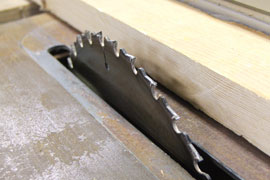 A workshop is a place full of productivity. Filled with tools and devices, this small hub can produce the most amazing and practical creations – but in order to keep it operating, there needs to be a significant amount of electricity. To keep your workshop running smoothly, here are some things to consider when it comes to the electrical setup.
A workshop is a place full of productivity. Filled with tools and devices, this small hub can produce the most amazing and practical creations – but in order to keep it operating, there needs to be a significant amount of electricity. To keep your workshop running smoothly, here are some things to consider when it comes to the electrical setup.
Lighting
Lighting is extremely important in the workshop. Often our workshops are found in a garage or a dark room off the home. In order to see all the intricate details and get your cuts just right you need to be able to see what you’re doing. Don’t compromise safety by working in a dimly lit room – install proper light fixtures. The most common electrical fixtures are fluorescent overhead, these are easy to install, energy efficient, and provide sufficient lighting. Correctly placing these around your workshop will help brighten up your workspace and allow you to move about freely without adjusting lamps. Another option to consider is track lighting. With track lighting and floodlights you can adjust the lights to cover your workspace and provide vivid lighting to the area that needs it the most. When installing these light fixtures it is important that everything is connected correctly. You don’t want your lights shorting out, flickering, or causing interrupts for your tools.
Energy Consumption
In addition to the electricity consumed by workspace lighting, you have a number of high-powered tools constantly in use. From table saws to routers, there is always a strain on your electrical system to power these tools. When setting up your workshop, it is a good idea to place the circuits on their own breaker separate from the rest of the house. This will prevent other appliances and electronics in the house from causing trips in the breaker when activated simultaneously while other tools are in use.
Another option to consider is to install a surge protector on the breaker that is being used for your workshop. The last thing you want is to have all your expensive equipment damaged by an electrical surge.
Lastly, ensure that GCFI receptacles are installed in the workshop. These outlets will shut off immediately to prevent the risk of electrical shock if a danger becomes present. These receptacles should be installed correctly for them to work properly. You will also need them placed around your workshop correctly so you do not need to constantly adjust the position of your tools.
Setting up a workshop can be complex and if not done properly, it can also be dangerous. We recommend that if you have a workshop at home or a business, that you have an expert electrician review the electrical setup and bring everything up to code for maximum safety. If you have any questions about your workshop wiring, contact your local Expert Electric.

